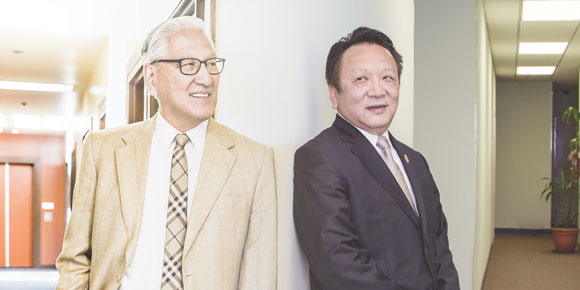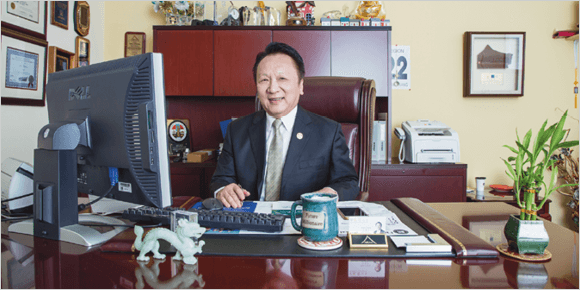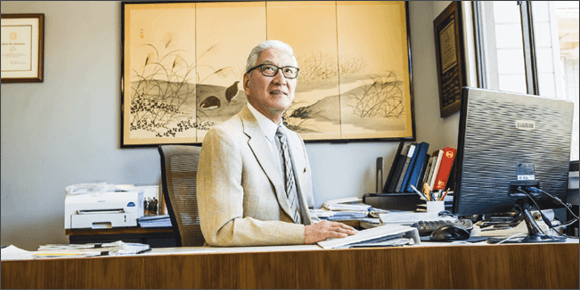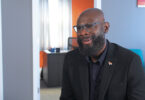Allen Okamoto, CRS, T. Okamoto & Co, San Francisco, California and Allen Chiang, CRS, Presidential Real Estate, Irvine, California
Pfleiger: Tell me how you got started in real estate.
Okamoto: Well, my father started in the business in 1946, right after World War II. He returned to San Francisco after he was in the Japanese-American internment camps. He started in insurance, and he got into real estate after the Japanese population started to grow because they needed housing. In 1965, I got into the business and the rest is history.
Chiang: My story is a little more interesting than his. I was really unhappy with my real estate agent when I purchased my first house and I thought, “I can do better.” So I got my license and I’ve been doing real estate since. From that day [in 1986], I’ve been trying to make our industry better.

Allen Okamoto and Allen Chiang are two founders of the Asian Real Estate Association of America (AREAA), one of the fastest-growing real estate networking organizations in the U.S. Okamoto, known as “the Godfather of AREAA” and Chiang, who Okamoto calls the “Jackie Chan of AREAA,” spoke with CRS President Janelle Pfleiger about their organization, the importance of the CRS Designation and the future of our industry.
Okamoto: Just to give you some background on Mr. Chiang, he now currently has five offices, 400—450 agents, making him the owner of the largest ethnically owned, independently owned real estate office in the U.S.
Pfleiger: It’s safe to say you did better than your real estate agent, Mr. Chiang. What prompted you to seek your CRS Designation, and why does CRS stand out from other designations?
Chiang: CRS is really the root of the real estate industry. The other designations are shining your license, but CRS is really root knowledge and it can move the majority of the industry to a higher level of achievement and make a standard across the board. Everything else is a specialty, but CRS is the real standard. Every time I make a referral, I look for a CRS so it’s someone I can trust.
Okamoto: I don’t have 13 designations like Mr. Chiang, but I have my GRI, SRES and CRB. AREAA went to the CRS office in Chicago to see if we could work together and collaborate. Before that, I never thought about getting my CRS because I got my CRB, but as I got to know the organization, I realized it was the one I probably should have gotten first because CRS education programs are so superior.

Allen Chiang got into real estate in 1986, after a bad experience with his agent. He now has five offices and nearly 450 agents.
Pfleiger: Tell me how AREAA came to be.
Okamoto: The story of AREAA goes back more than the 14 years of our existence.
I was the president of the San Francisco Association of Realtors in 1990, and in preparing for my position, I looked at all the committees and board members. I wanted to see the involvement of Asians and people of color, and I wanted to have gender equality in the association. I was shocked to find out that I was not only the first Asian president of the association, I was the first elected Asian board member in its history. So I made it my goal to bring more people of color into the association. In being involved in associations and committees over the years, I met a lot of people and I saw there was a definite need for a national Asian real estate association. Due to a lot of hard work by people like Mr. Chiang and others, we were able to get it started. Now we have 34 chapters and 15,000 members. Over 14 years, that’s amazing growth.
Chiang: My story is much simpler than his. I was forced to join by Allen. Eventually, Allen asked me to step in for the national treasurer, and in 2009, I was the national chair, when we started to see the markets crash. Then there was this real need for the networking and the people holding up their education and their knowledge to get through this difficult time. I decided to stay in the organization, where we are not only growing here, but we are also expanding our international network.

Real estate was the family business for Allen Okamoto. He later became the first Asian president of the San Francisco Association of REALTORS® in 1990.
Pfleiger: What obstacles do you see for our industry and for our organizations?
Okamoto: Bill Chee, the first Asian president of the National Association of REALTORS®, gave this famous speech and referred to “the lions coming over the hill.” He was talking about Microsoft and some of the big computer companies coming in and taking over the real estate industry and almost eliminating the agent because, through technology, the consumer could just get on a computer and do the real estate transaction. Just recently, Joel Singer, the CEO of the California Association of REALTORS® gave a talk saying that is no longer the case. We’re not worried about the internet now because the internet is helping the agent. While transactions are initiated by the consumer getting on the web, the real estate agent is the actual negotiator and consummator of the transaction.
Chiang: Everybody needs to look into their future, 10 years into the future, and see if you’re going to drop out or if you’re going to continue, because the new generation is coming and you need to adapt. In the next five to 10 years, we won’t need you to drive the car to the house. We will have comfortable massaging chairs in our offices, and you will just go from property to property and the agent will just operate a computer for you. So not only is the technology going further, but because of that, agents are criticized for making too much commission, so the consumer starts to put pressure on the commission. So now you may have to lower commission, but find a way to do less work. The younger generation will come out and do that best.
They say “knowledge is power,” but now I would say trust is power, and the key factor for the next 10 years. People can do everything on the internet, but they’re still missing that trust. They have to have that trust in real estate. And that’s something the younger generation coming up still needs. They have the technology piece, but not always the trust. An 18-year-old kid can operate a virtual tour to show a house, but are you going to a buy a million-dollar house through him? Both sides of the transaction need to have that trust that you can’t just find on the internet. Trust will be the one thing you need in the next five to 10 years with all the new technology.
Pfleiger: What’s the most exciting thing about being a REALTOR® as well as a CRS or AREAA member today?
Okamoto: Initially when I got into the business, the money was the motivating factor. I thought it was a great profession where I could make money, but now I’ve been in the business so long, it’s the people that motivate me.
Chiang: I think CRS is knowledge and AREAA is culture. Put those two together and it’s a formula for trust.
Allen Chiang achieved his CRS Designation in 2003. He can be reached at 949-337-3388 or at allen.chiang@presidentialinc.com. Allen Okamoto achieved his CRS Designation in 2011. He can be reached at 415-931-6295 or at allen@tokamoto.com.







